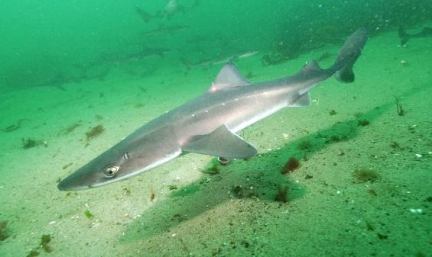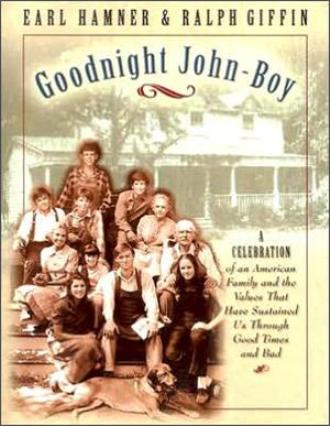

The March Special Guest Story is by Earl Hamner
Please feel free to visit Earl at: http://earlhamner.com/

PETS
by Earl Hamner
When Ernest Hollins was forty-two years old, his mother died. Soon after she was buried, he took a summer job as a cook in a fishing camp. He could not believe the contentment his new life brought him now that he was finally on his own.
He had always loved cooking, and it was rewarding to have the guests compliment him on one of his dishes. He had a hard time admitting it to himself but it was a merciful relief not to hear his mother's plaintive voice calling from her bedroom to complain that she was hungry or that she needed her bedpan or to remind him that it was time for him to administer her shots.
He also enjoyed the isolation of the camp. It consisted of a series of buildings floating on pontoons; an entire settlement docked in a secluded cove in British Columbia's Queen Charlotte Islands. In addition there was a guide shack, a boat dock, a utility shed and a fish shack. The place was owned by Piers Lundgren, a Vancouver businessman who operated it in connection with his extensive lumbering enterprise. The guests were mostly rich businessmen from the states or business colleagues of Lundgren's.
This morning Ernest woke as usual at four o'clock. Sometimes he could hear the distant voice of a wolf, but the only sound that came to him this early morning was the faint throb of the generator.
He turned on the light and looked around the small room with pleasure. He had brought a few things from his mother's house, such as the series of framed Redoute roses, which he had hung and which gave the room a touch of elegance. A book case beside the bed held a cassette player, two small speakers, a copy of The Holy Bible, some paper back mysteries, and his collection of cook books. On the top shelf was the beginning of a collection of sea shells which he had started since he had come to the camp.
Ernest went to the bathhouse and took a quick shower. While he toweled himself he stepped in front of the full-length mirror and examined his image. His arms were so long his hands fell nearly to his knees. An alarming droopiness had become visible in each of his breasts, and he wondered if such flabbiness ran in the family and if that indignity was in store for him. He shook his head in despair over the fat, round belly. He never drank beer and rarely ate to excess. Where did it come from?
Finally he dried and dressed. Before leaving the bathhouse, he threw all the towels the guests used in the dirty clothes hamper and hung new ones in straight rows on the racks. He was a freak for neatness. He could not stand disorder.
In the kitchen he lit the fire in the old wood cooking range, which he had laid the night before and turned on the coffee machine. Even though he was not obliged to serve them breakfast he liked to send the early morning fisherman off with something in their stomachs. Soon the aroma of coffee in the making blended with the yeasty smell of the dough he was kneading.
At five o'clock he crossed to the main lodge and went from door to door to announce the hour. Some of the guests were already awake and when Ernest returned to the dining room it had already begun filling up and resounding to the early morning voices of men in hushed anticipation of a day's fishing.
The guides were not encouraged to come into the dining room or to fraternize with the guests other than when they out on the fishing grounds. The one guide who violated the restriction most frequently was a fellow Ernest heartily despised.
His name was Jake, a hairy gorilla of a man, who would think nothing of barging into the dining room to complain. Ernest would never serve watery scrambled eggs or stale bread like Jake always accused. Some days Ernest suspected that Jake merely staged his loud complaints only to embarrass him. He could not imagine why.
After all the guides and guests were gone, Ernest had the camp to himself. He went to the edge of the dock where he had fashioned a chair from an old wooden barrel. He picked up a bucket of leftover food and tossed out a fish head and some leftover sausage patties.
He then took his seat and waited for his pets.
The eagle was usually the first to arrive. He was a fledgling and perhaps less cautious than an older bird might have been. Each morning he would fly to the same branch on the top of a redwood tree. He would remain there, a white hooded statue, and wait until Ernest threw out food. After a while the eagle would soar down, lightly touch the surface of the water and then rise again with a fish gripped in his talons.
Sometimes the seal would come. He had become bold over the months Ernest had been feeding him and now he would approach as close as six or eight feet of the dock. Ernest kept a supply of live herring for the seal that would leap out of the water to receive them when Ernest tossed them out one by one. Sometimes a sea gull would compete with the seal for the herring, but gulls were more of a pest than a pet, so Ernest tried to discourage him from coming at all.
And then there were the fish.
The underwater pets that the most fascinating of all. He had discovered them by accident one morning when he emptied a bucket full of ling cod heads and entrails over the side of the deck. Before the waste had a chance to sink there was a roiling in the water as a school of sleek blackish gray creatures rose to the surface, took an enormous gulp and then slid back into the depths.
These fish had large mischievous eyes and underbellies as white a snow, but cruel mouths of sharks. At first there had been only a few small fellows, but the more he fed them, the larger they grew and the more numerous they became. Ernest was convinced that as many as a hundred of them had become permanent residents under his dock. He found a name for them in the fish book in the lodge. They were a variety of mud shark, better known to the guides and guests as dogfish.
He tried to keep their presence a secret because the guides hated them and killed them whenever one was brought to the boat. The dogfish were considered pests because they took the bait that a salmon might have taken. It slowed down fishing and wasted bait. It was equally offensive that once a dogfish was hooked the fisherman’s line had to be cut and a new rig attached.
Whenever he heard one of the guides refer disparagingly to dogfish, Ernest smiled to himself, wondering what the guide world say if he knew that perhaps a hundred of them lived under the dock. And they were there because he took care of them.
*****
Ernest’s idyllic existence changed the night he awoke to the smell of smoke. At first he told himself he was dreaming, but as the acrid presence in his nostrils became more intense, he rose from his bed in time to see dark smoke burst into bright flame in the guide shack.
At the same time the drunken guides became aware that the shack was on fire and came lumbering out of the building. By the time the fire had been extinguished, the shack was no longer livable and the guides had been assigned to other sleeping accommodations.
It was Ernest's hard luck to draw as a roommate, the hairy gorilla named Jake.
When Jake moved into Ernest's room, he took one look at the Redoute roses and said, "I thought so."
"Thought so what?" asked Ernest.
"Poo-poo," said Jake with a simper and pretended to throw him a kiss.
"Don't get try getting romantic with me," said Ernest and complimented himself on having made a snappy and resourceful rejoinder.
Jake proved to be an even more revolting man than Earnest had thought. He would consume great quantities of beer before going to bed and would snore the night away, exploding in great reverberating volcanic rumbles. The only relief Ernest got from the snoring was when Jake would wake up and urinate.
"Piss call," he would shout so loud he could easily be heard in Nome, Alaska. He would not use the bathroom but to Ernest's distress would stagger out to the dock and urinate in the same spot where Ernest fed his pets.
To make matters even worse, Piers Lundgren took Jake off the guide roster and assigned him to the job of repairing the bunkhouse so that Ernest had to put up with him all day as well as all night.
Jake would make a grand show of work for the first hour or so, but once guests and guides had all left for the fishing grounds he would walk away from his job and appropriate Ernest's chair on the dock.
"I take my rest there after breakfast," said Ernest the first time he found Jake sitting there. "I'd appreciate it if you'd move."
"Suck my tit," was the reply.
Ernest retreated to the kitchen and began peeling the potatoes for the potato salad he was making for dinner. When he looked out the window he saw that Jake had picked up one of the rods from the rack and was casting out using spoon bait.
Almost immediately Jake had one of the smaller dogfish on the line. He reeled it in and stabbed it in the stomach. The wound was not deep enough to kill the fish, but it went far enough to make it bleed copiously. With the hook still in it, Jake threw the dogfish over to where Ernest customarily threw food to the eagle. The injured fish remained on the surface, belly up, but still managing to swim in tight little circles.
Ernest ran to the dock, and to his dismay he saw that the eagle was on his perch waiting to be fed.
"What are you doing?" he demanded, his voice trembling with apprehension.
"Going to catch me that eagle over there," replied Jake.
"That eagle's a pal of mine," said Ernest. "I don't want him hurt."
"Won't hurt him. Just have a little fun.”
“I won’t stand for it.”
“Go climb your Grandma’s bung.”
The eagle leaned forward, released its hold on the perch and swooped down to the injured dogfish. Ernest shouted and waved his arms to distract it, but the eagle took to the air with the fish in its mouth and flew to the far side of the cove where it began to feed.
Jake held the rod ready to fix the hook in the eagle’s beak after it swallowed the hook. He was transfixed, posed, waiting for the first tug on the line such as a salmon would make when it took the hook.
Ernest tried to grab the rod but Jake pushed him away. At the same moment the eagle bit into the fish. Jake jerked the rod sharply. Surprised, the eagle took to the air and Jake set the hook more deeply. The fishing line snapped taut turning the bird in midair. The eagle lost altitude and fluttered to the water. Jake began reeling in.
The eagle fought against the line its eyes stricken, its wings beating the water, but the filament held and Jake dragged the bird closer and closer to the dock. He gave the bird enough slack so that it sensed freedom and began swimming away, but Jake was not finished with his sport and began reeling it back again.
“Stop it!” ordered Ernest. If he heard, Jake showed no sign. Nor did he see Ernest frantically look about for a weapon and pick up a two-by-four. Heisting the heavy board high over his head, Ernest approached Jake from behind. It took only one blow and Jake slumped unconscious to the dock.
Ernest grasped the fishing rod, and as painful as it was to reel in the eagle, he knew the hook would have to be removed. Until he drew it within arm's reach, Ernest had not realized the size and strength of the bird. He was able finally to grasp it by the neck and locate the hook, which was embedded just behind the eagle’s tongue. By the time he was able to let go of the bird’s white head, it was flecked with blood. Ernest released the eagle, giving it a slight toss into the air. It fluttered across the cove. With some difficulty it took to the air, gained altitude and came to rest on top of its nest in the redwood tree.
Ernest was so occupied with releasing the eagle that he had momentarily forgotten about Jake. He looked behind him and saw that the guide had regained consciousness and was attempting to rise.
“I’m going to fucking kill you,” Jake said.
Ernest believed him, but he resolved not to go without a struggle. He picked up the two-by-four he had used earlier and gripped it firmly.
Jake was fully on his feet by now and lurching drunkenly toward Ernest.
Ernest brought the two-by-four down with such force that Jake slumped, staggered for a moment, and then fell off the edge of the deck.
“You son of a bitch!” he called.
“Suck my tit!” shouted Ernest.
It was the last thing Jake was to hear before he was surrounded by a school of dogfish with their mischievous eyes and their white bellies and their slashing jaws.
Earl Hamner is best known as the creator and producer of two Emmy Award-winning series, “The Waltons” and “Falcon Crest.”
He is also the producer of many other television series and specials, and has written for “The Guild on the Air,” “Wagon Train,” “The Twilight Zone,” “CBS Playhouse” as well as “The Today Show.”
His short stories have been published in The Strand, Dark Discoveries, The Twilight Zone Anthology edited by Carol Serling, and The Bleeding Edge and The Devil’s Coat Tail from the publishers of Dark Discovery Magazine.
He is the author of eight best-selling books. His latest book, Odette, a Goose of Toulouse was inspired by his reaction to seeing a goose who seems destined to become pate, but who becomes an opera singer instead. The book is available at Amazon.com where one reviewer called it a “minor classic.”
Earl Hamner and Jane, his wife of fifty-seven years, live in Studio City and Laguna Beach, California with a bossy pug named Peaches. Their son Scott, who lives in Vermont, is Co-head writer for the daytime series “The Young and the Restless.” Their daughter Caroline is a family therapist and lives with her husband in Laguna Beach, California.


